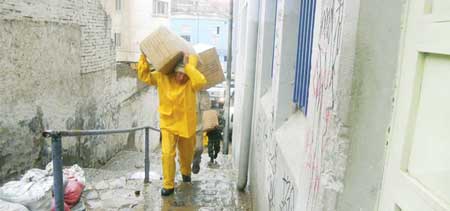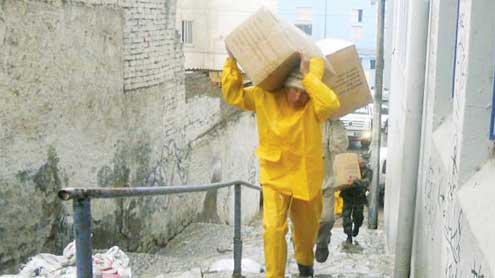
Photo courtesy of Salvation Army Valparaíso
The Valparaíso shelter receives help from government officials to house more people.
Due to extreme cold weather and rain in Chile, Superintendent (city manager) Raúl Celis and Regional Secretary of Social Development María de los Ángeles de la Paz are seeking to keep homeless people off the streets of Valparaíso by expanding the capacity at the city’s Salvation Army shelter through the donation of 80 mattresses, 120 blankets, clothing and food to get them through the harsh winter.
“It fills me with satisfaction to strengthen a Salvation Army institution that has served the community for more than 100 years,” Celis said in a public statement. “We are making this donation for everyone to take advantage of if they need a place to stay.”
This governmental contribution will increase the shelter’s capacity from 60 to 200 people. The relationship between The Salvation Army homeless shelter and Celis and Paz evolved through the Army’s strong ties to the National Office of Emergency Services and Public Safety, which arranged transport of the donations to the shelter.
“The measures taken by the government contingency respond to the need generated through the extreme weather conditions that surround the Valparaíso region, which are often accompanied by rain and strong winds,” said Captain Jorge Aicón, director of the shelter.
According to a Valparaíso Channel 13 television report, two homeless individuals died last year in Chile from exposure to the cold temperatures and rain storms. Aicón said that the shelter is doing what it can to prevent this from happening again.
“Winter is the time when the shelter needs the most support,” Aicón said. “Thanks to this contribution, we will be able to better serve the people on the streets who need it.”
The Chilean National Socioeconomic Characterization survey records from 2011 reveal almost 17 percent of the Valparaíso region living below the poverty line, which is approximately a 2 percent increase from 2009. This makes the shelter critical to the lives of these individuals, keeping many from sleeping on the streets and providing them with food, access to hygienic necessities and laundry stations, as well as physical and spiritual support and guidance.
“The Army in Valaparaíso is a place that the community knows they can count on,” Aicón said. “They are grateful that we are here for them when they need it the most.”
Future projects for The Salvation Army in Valparaíso include generating resources to renovate parts of the shelter, and expanding outreach to people in neighboring cities who need a place to stay. Aicón hopes to also establish a canteen in the Valparaíso region to feed the community in case of emergencies or disasters.
“Our goal is to keep working hard for our community for another 100 years in Valparaíso, and expand our efforts to other communities to respond to the needs of mankind,” Aicón said.












